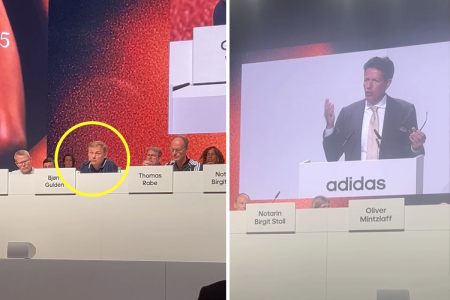‘Compassion is not a compromise’: Adidas makes a surprising move
By
Maan
- Replies 0
Luxury labels and sporting giants often tout their materials as cutting‑edge, but sometimes the true cost of those choices only comes to light under scrutiny.
One high‑profile brand just signalled a dramatic shift after mounting ethical pressure placed its long‑standing practices in the spotlight.
The ripple effects of this decision could reshape an entire Australian industry and spark a fresh debate on how our favourite products are really made.
Adidas signalled a pivotal shift in footwear manufacturing when it revealed at its 15 May Annual General Meeting in Fürth, Germany, that it had not purchased kangaroo leather since August last year and would wind up production by the end of 2025.
The decision arrived after years of campaigning by United States‑based animal‑rights group Center for a Humane Economy, whose president Wayne Pacelle travelled from Washington to Frankfurt and told the board it was ‘time for this very strong global brand to divorce itself from the largest massacre of terrestrial wildlife in the world’.
Pacelle’s six‑minute address preceded chief executive Bjørn Gulden’s declaration—met with applause from roughly 250 shareholders—that the German company had already cut K‑leather from its supply chain.
Gulden maintained the move had not been driven by the campaign and argued in German that the kangaroo meat industry regulated populations while shoe production merely used ‘waste products’, adding: ‘We’ll see now because I hope you come every year, and then we can see if it improves just because we don’t make the shoes.’
In a follow‑up email to Yahoo, Adidas confirmed it had halted purchases in 2024 and would cease manufacturing before 2025 closed.
Although kangaroo hides formed only a small proportion of Adidas’s materials, the announcement dented industry morale, as advocates of wild harvesting had long insisted their product was more sustainable than cow leather.
The Australian Wild Game Industry Council asserted shooters worked to ‘minimise pain, suffering and distress’ and employed research‑based methods to euthanise joeys orphaned during hunts.
Pacelle countered that leather remained crucial to the economics of the trade because most flesh ended up as pet food, and he expressed bafflement at Adidas’s delay in publicising a policy already in place.
Protests had persisted outside stores across the United States, with activists brandishing placards inside shops and demanding Adidas drop kangaroo leather, actions Pacelle said created ‘a lot of clamour within the company’.
Animal welfare organisations worldwide hailed the news, and Center for a Humane Economy’s director of international programs Jennifer Skiff declared: ‘Adidas’s decision marks a historic milestone in animal protection and corporate responsibility. This sends a clear message: compassion is not a compromise. Cruelty has no place in commerce.’
TheirTurn organiser Donny Moss added: ‘This win belongs to every advocate who stood outside a store, signed a petition, or raised their voice.’
In Australia, Animal Justice Party MP Emma Hurst labelled the outcome a victory for ‘transparency, ethics, and global consumer expectations’, while Alyssa Wormald from the Victorian Kangaroo Alliance said reduced demand was forcing shooters to abandon the field and warned the industry was ‘dying’.
Kangaroo leather continued to appear in luxury accessories and was still used by Japanese sports brands Mizuno and ASICS, prompting campaigners to shift their focus to those companies and potential growth markets such as China.
In a previous story, we explored how iconic Australian products are making bold moves towards sustainability.
These changes reflect a growing shift in industries across the country.
Be sure to read on to discover how one beloved Aussie food product is leading the way with its innovative packaging.

With Adidas leading the way in moving away from kangaroo leather, what impact do you think this will have on the future of wildlife conservation and the fashion industry?
Let us know your thoughts in the comments.
One high‑profile brand just signalled a dramatic shift after mounting ethical pressure placed its long‑standing practices in the spotlight.
The ripple effects of this decision could reshape an entire Australian industry and spark a fresh debate on how our favourite products are really made.
Adidas signalled a pivotal shift in footwear manufacturing when it revealed at its 15 May Annual General Meeting in Fürth, Germany, that it had not purchased kangaroo leather since August last year and would wind up production by the end of 2025.
The decision arrived after years of campaigning by United States‑based animal‑rights group Center for a Humane Economy, whose president Wayne Pacelle travelled from Washington to Frankfurt and told the board it was ‘time for this very strong global brand to divorce itself from the largest massacre of terrestrial wildlife in the world’.
Pacelle’s six‑minute address preceded chief executive Bjørn Gulden’s declaration—met with applause from roughly 250 shareholders—that the German company had already cut K‑leather from its supply chain.
Gulden maintained the move had not been driven by the campaign and argued in German that the kangaroo meat industry regulated populations while shoe production merely used ‘waste products’, adding: ‘We’ll see now because I hope you come every year, and then we can see if it improves just because we don’t make the shoes.’
In a follow‑up email to Yahoo, Adidas confirmed it had halted purchases in 2024 and would cease manufacturing before 2025 closed.
Although kangaroo hides formed only a small proportion of Adidas’s materials, the announcement dented industry morale, as advocates of wild harvesting had long insisted their product was more sustainable than cow leather.
The Australian Wild Game Industry Council asserted shooters worked to ‘minimise pain, suffering and distress’ and employed research‑based methods to euthanise joeys orphaned during hunts.
Pacelle countered that leather remained crucial to the economics of the trade because most flesh ended up as pet food, and he expressed bafflement at Adidas’s delay in publicising a policy already in place.
Protests had persisted outside stores across the United States, with activists brandishing placards inside shops and demanding Adidas drop kangaroo leather, actions Pacelle said created ‘a lot of clamour within the company’.
Animal welfare organisations worldwide hailed the news, and Center for a Humane Economy’s director of international programs Jennifer Skiff declared: ‘Adidas’s decision marks a historic milestone in animal protection and corporate responsibility. This sends a clear message: compassion is not a compromise. Cruelty has no place in commerce.’
TheirTurn organiser Donny Moss added: ‘This win belongs to every advocate who stood outside a store, signed a petition, or raised their voice.’
In Australia, Animal Justice Party MP Emma Hurst labelled the outcome a victory for ‘transparency, ethics, and global consumer expectations’, while Alyssa Wormald from the Victorian Kangaroo Alliance said reduced demand was forcing shooters to abandon the field and warned the industry was ‘dying’.
Kangaroo leather continued to appear in luxury accessories and was still used by Japanese sports brands Mizuno and ASICS, prompting campaigners to shift their focus to those companies and potential growth markets such as China.
In a previous story, we explored how iconic Australian products are making bold moves towards sustainability.
These changes reflect a growing shift in industries across the country.
Be sure to read on to discover how one beloved Aussie food product is leading the way with its innovative packaging.
Key Takeaways
- Adidas announced it stopped using kangaroo leather in 2024 and will end production by 2025.
- The decision followed pressure from animal rights campaigns highlighting welfare concerns.
- Industry defenders argue kangaroo leather is sustainable, but critics dispute this and condemn hunting practices.
- The move has sparked global praise and shifted attention to other brands still using kangaroo leather.
With Adidas leading the way in moving away from kangaroo leather, what impact do you think this will have on the future of wildlife conservation and the fashion industry?
Let us know your thoughts in the comments.








